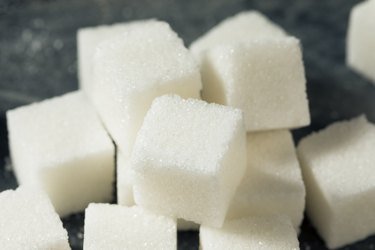
Keeping your arteries less clogged will help blood flow easier through your body and keep your system in good shape, but it takes some work to stay away from those foods that narrow your arteries and possibly lead to health problems. Put these four food components on your watch list.
Read more: A Possible Downside to Herbal Supplements
Video of the Day
Video of the Day
1. Salt
Top on the list of so-called vasoconstrictor foods that can cause narrow arteries is salt. "Diets that are chronically high in salt can damage your blood vessels due to high blood pressure," explains Kailey Proctor, MPH, RDN, a dietitian/nutritionist with St. Joseph Hospital in Orange County, California. "The constant force from blood pressure being too high stiffens blood vessels."
Most people think the salt shaker is the biggest culprit when it comes to added salt, "but that isn't always the case," Proctor says. "Oftentimes it is salt from processed foods, such as potato chips, sauces, condiments, frozen meals and canned goods." When possible, opt for low-salt or reduced-salt products. Use lemon, lime, herbs and spices to season foods instead, Proctor suggests.
A teaspoon of salt contains about 2,300 milligrams (mg) of sodium. The American Heart Association (AHA) recommends no more than that a day for most people. If you have high blood pressure, try to limit your salt intake to 1,500 mg a day, the AHA advises.
2. Sugar
Sugar also can lead to constricted blood vessels, Proctor says.
Sugar is found in high quantities in processed foods, such as cookies, cakes, sweetened beverages and candy, she says. "This sugar can make blood vessels stiff by increasing inflammation in the body. Foods high in sugar also tend to be calorie dense, which eaten in excess can cause weight gain."
Weight gain can cause blood pressure to rise, according to the National Heart, Lung, and Blood Institute. "All these combined can cause damage to your blood vessels," Proctor says.
Like salt, sugar also can be hiding in foods and you may not realize it's there. Among them, according to Johns Hopkins Medicine, are breakfast cereal, yogurt, salad dressings and barbecue sauce. The AHA recommends that most people limit the amount of sugar in their diet to 25 grams (about 6 teaspoons) a day for women and 36 grams (about 9 teaspoons) a day for men.
3. Caffeine
Caffeine may not be as obvious as salt and sugar, but it, too, can lead to constricted blood vessels in some people, according to the Mayo Clinic.
Debbie Petitpain, RDN, a spokeswoman for the Academy of Nutrition and Dietetics, says that some people may be more sensitive to caffeine than others. You can check whether caffeine affects you by checking your blood pressure before and 30 minutes to 2 hours after drinking a cup of coffee, keeping in mind that the specific brand and how you brew it also can affect the amount of caffeine in your coffee, according to Mayo Clinic.
In addition to coffee, common sources of caffeine include tea, sodas, energy drinks and chocolate, Mayo Clinic notes.
On the flip side, caffeine can sometimes come to your aid if you're dealing with a headache. Blood vessels tend to enlarge before you have a headache or migraine. Because caffeine can cause the blood vessels to narrow, it may aid in headache relief, according to the National Headache Foundation.
But striking the right balance is key, as too much caffeine over time can actually cause headaches. If you're trying to withdraw from caffeine, do so slowly, to avoid getting a rebound headache, the Mayo Clinic advises.
4. Licorice
Also, seemingly innocent licorice — which is used to make tea, candy and gum, alcoholic beverages and other spices — is actually a vasoconstrictor food.
While the root of the licorice plant may help digestive upsets and other conditions, it can also constrict blood vessels and raise blood pressure, according to the National Center for Complementary and Integrative Health. In large amounts, its active compound, glycyrrhizic acid, can cause you to retain sodium and lose potassium through your kidneys. In turn, your blood pressure can rise.
A study published in Foods in October 2019 reports that, because licorice has been proven to raise blood pressure and can have other cardiovascular effects on the body, it should be consumed with caution.
- Kailey Proctor MPH, RDN, dietitian, St. Joseph Hospital, Orange County, California
- American Heart Association: “How Much Sodium Should I Eat Per Day"
- National Heart, Lung and Blood Institute: “Your Guide to Lowering Blood Pressure”
- Johns Hopkins Medicine: “Finding the Hidden Sugar In the Foods You Eat”
- Mayo Clinic: Caffeine: “How Does It Affect Blood Pressure”
- Debbie Petitpain, MS, RDN, LDN, wellness director, Sodexo, Office of Health Promotion, Medical University of South Carolina, Charleston; media spokesperson, Academy of Nutrition and Dietetics
- Mayo Clinic: "What Are Hidden Sources of Caffeine?"
- National Headache Foundation: “Does Caffeine Trigger or Treat Headaches?”
- National Center for Complementary and Integrative Health: “Licorice Root”
- Foods: “Bioactive Candy: Effects of Licorice on the Cardiovascular System”
- AHA: "Tracking Down Added Sugars on Nutrition Labels Infographic"
Is this an emergency? If you are experiencing serious medical symptoms, please see the National Library of Medicine’s list of signs you need emergency medical attention or call 911.